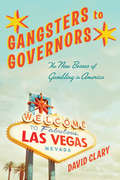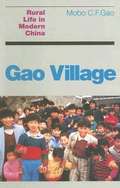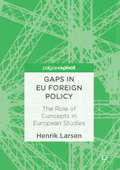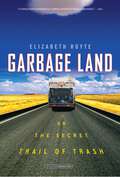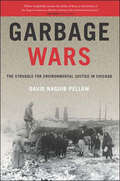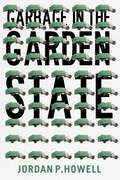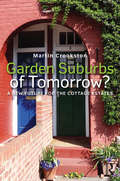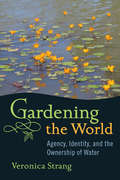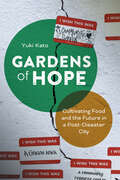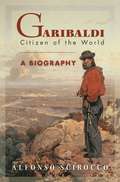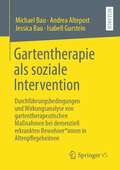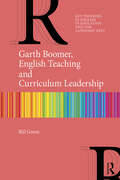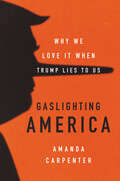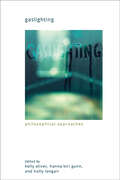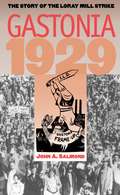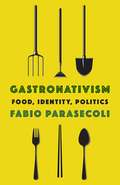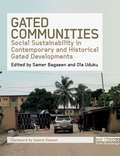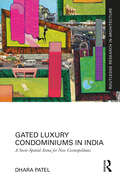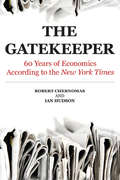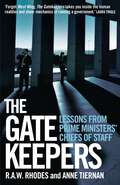- Table View
- List View
Gangsters to Governors: The New Bosses of Gambling in America
by David ClaryGenerations ago, gambling in America was an illicit activity, dominated by gangsters like Benny Binion and Bugsy Siegel. Today, forty-eight out of fifty states permit some form of legal gambling, and America’s governors sit at the head of the gaming table. But have states become addicted to the revenue gambling can bring? And does the potential of increased revenue lead them to place risky bets on new casinos, lotteries, and online games? In Gangsters to Governors, journalist David Clary investigates the pros and cons of the shift toward state-run gambling. Unearthing the sordid history of America’s gaming underground, he demonstrates the problems with prohibiting gambling while revealing how today’s governors, all competing for a piece of the action, promise their citizens payouts that are rarely delivered. Clary introduces us to a rogue’s gallery of colorful characters, from John “Old Smoke” Morrissey, the Irish-born gangster who built Saratoga into a gambling haven in the nineteenth century, to Sheldon Adelson, the billionaire casino magnate who has furiously lobbied against online betting. By exploring the controversial histories of legal and illegal gambling in America, he offers a fresh perspective on current controversies, including bans on sports and online betting. Entertaining and thought-provoking, Gangsters to Governors considers the past, present, and future of our gambling nation. Author's website (http://www.davidclaryauthor.com)
Ganztagsbildung: Kooperation von Jugendhilfe und Schule? (Soziale Arbeit als Wohlfahrtsproduktion #26)
by Karin Böllert Oliver Bokelmann Jana DemskiDer Band stellt aktuelle Diskurse zu Ganztagsbildung mit Blick auf die Kooperation von Jugendhilfe und Schule dar und gibt Impulse zur theoretischen und empirischen Vergewisserung kooperativer Praxis. In den Blick genommen werden das Zusammenwirken verschiedener Bildungsinstitutionen und Akteur*innen, unterschiedliche Bildungsverständnisse sowie differente Erwartungen an Ganztagsbildung. Die Beiträge beschäftigen sich sowohl mit etablierten Formen der Zusammenarbeit über das Handlungsfeld Schulsozialarbeit, Ganztagsbetreuung und Jugendsozialarbeit, als auch mit neuen Perspektiven und Entwicklungen, u. a. im Hinblick auf Fragen von Kinderschutz, Beratung, Bildungslandschaften oder Demokratiebildung. Der Rechtsanspruch auf Ganztagsbetreuung im Grundschulalter ab 2026 unterstreicht die Aktualität der behandelten Thematik.
Gao Village: Rural Life in Modern China
by Mobo GaoThis book is about Gao Village, in Jiangxi province, where the author was born and brought up, leaving when he was twenty-one to study English at Xiamen University. Since emigrating to Australia in 1990, he has returned every year to Gao Village, where his brother still lives. <p><p> Several accounts of village life in China have been published, but all have been by Western or urban Chinese scholars. Mobo Gao's account is in every sense one from the inside. Though written as an academic work, it does not eschew personal stories and experiences relevant to the themes addressed. These cover a forty-year period and fall into four distinct themes; the village before and after land reform; the commune system; the dismantling of the communes; and the unfolding impact of the market economy, including increased migration to urban areas, from the late 1980s onwards.
Gaps and Actions in Health Improvement from Hong Kong and Beyond: All for Health
by Ben Yuk Fai Fong William Chi Wai WongThis book provides a timely review on what has been accomplished, and what remains amiss, following the World Health Organization’s 1978 ‘Health for All’ campaign, by identifying enduring gaps in health care within a global context. The WHO declaration of "Health for All by the Year 2000" mapped out a road towards primary health care for all people and demarcated it as essential for human progress in terms of economic development and social justice. However, 45 years have gone by, and most societies and countries have yet achieved 'health for all’, despite so much having changed in technology, disease patterns, and population demographics. In promoting community health and improving service delivery, the book advocates the development and implementation of “All For Health” strategies to steer stakeholders in the right direction towards universal health care. The book covers the gaps and actions in health improvements, the ‘All For Health’ strategies, and the Health in All Policies (HiAP), reviewing and discussing issues through both Asian and international examples. Contributors include both academics and practitioners from diverse professional backgrounds including medicine, nursing, pharmacy, allied health, dietetics, social sciences, life sciences, education, business, administration, law, and public policy. Essential to scholars in public health and related disciplines, this book is also useful to policymakers, community and public health practitioners, and health care executives and interns.
Gaps in EU Foreign Policy
by Henrik LarsenThis book argues that theories of European foreign policy are performative: they create the objects they analyse. In this text, Larsen outlines the performativity approach to the role of theories based on the work of Derrida and goes on to examine the performative role of Christopher Hill's concept of Capability-Expectations Gap in the study of European foreign policy. Through examples from relevant literature, Larsen not only demonstrates how this concept sets up standards for the EU as a foreign policy actor (that are not met by most other international actors) but also shows how this curtails analysis of EU foreign policy. The author goes on to discuss how the widespread use of the concept of 'gap' affects the way in which EU foreign policy has been studied; and that it always produces the same result: the EU is an unfulfilled actor outside the realm of "normal" actors in IR. This volume offers new perspectives on European foreign policy research and advice and serves as an invaluable resource for students of EU foreign policy and, more broadly, European Studies.
Garbage In, Gospel Out? Controlling for the Underreporting of Remittances
by David A. Grigorian Tigran A. Melkonyan J. Scott ShonkwilerA report from the International Monetary Fund.
Garbage Land: On the Secret Trail of Trash
by Elizabeth RoyteInto our trash cans go dead batteries, dirty diapers, bygone burritos, broken toys, tattered socks, eight-track cassettes, scratched CDs, banana peels... But where do these things go next? In a country that consumes and then casts off more and more, what actually happens to the things we throw away?
Garbage Wars: The Struggle for Environmental Justice in Chicago (Urban and Industrial Environments)
by David Naguib PellowA study of the struggle for environmental justice, focusing on conflicts over solid waste and pollution in Chicago.In Garbage Wars, the sociologist David Pellow describes the politics of garbage in Chicago. He shows how garbage affects residents in vulnerable communities and poses health risks to those who dispose of it. He follows the trash, the pollution, the hazards, and the people who encountered them in the period 1880-2000. What unfolds is a tug of war among social movements, government, and industry over how we manage our waste, who benefits, and who pays the costs.Studies demonstrate that minority and low-income communities bear a disproportionate burden of environmental hazards. Pellow analyzes how and why environmental inequalities are created. He also explains how class and racial politics have influenced the waste industry throughout the history of Chicago and the United States. After examining the roles of social movements and workers in defining, resisting, and shaping garbage disposal in the United States, he concludes that some environmental groups and people of color have actually contributed to environmental inequality.By highlighting conflicts over waste dumping, incineration, landfills, and recycling, Pellow provides a historical view of the garbage industry throughout the life cycle of waste. Although his focus is on Chicago, he places the trends and conflicts in a broader context, describing how communities throughout the United States have resisted the waste industry's efforts to locate hazardous facilities in their backyards. The book closes with suggestions for how communities can work more effectively for environmental justice and safe, sustainable waste management.
Garbage in the Garden State (CERES: Rutgers Studies in History)
by Jordan P. HowellGarbage in the Garden State is the only book to examine the history of waste management in New Jersey. The state has played a pioneering role in the overall trajectory of waste management in the US. Howell's book is unique in the way that it places the contemporary challenges of waste management into their proper historical context – for instance, why does the system for recycling seem to work so poorly? Why do we have so many landfills in New Jersey, but also simultaneously not enough landfills or incinerators? Howell acknowledges that New Jersey is sometimes imagined, particularly by non-New Jerseyans, as a giant garbage dump for New York and Philadelphia. But every place has had to struggle with the challenges of waste management. New Jersey's trash history is in fact more interesting and more important than most. New Jersey’s waste history includes intensive planning, deep-seated political conflict, organized crime, and literally every level of state and federal judiciary. It is a colorful history, to say the least, and one that includes a number of firsts with regard to recycling, comprehensive planning, and the challenging economics of trash.
Garden Suburbs of Tomorrow?: A New Future for the Cottage Estates (Planning, History and Environment Series)
by Martin CrookstonNamed one of the Top 10 books about council housing - the Guardian online Faced with acute housing shortages, the idea of new garden cities and suburbs is on the UK planning agenda once again, but what of the garden suburbs that already exist? Over the first six decades of the twentieth century, councils across Britain created a new and optimistic form of housing – the cottage estates of ‘corporation suburbia’. By the early 1960s these estates provided homes with gardens for some 3 million mainly working-class households. It was a mammoth achievement. But, because of what then happened to council housing over the later years of the century, this is not very often appreciated. In Garden Suburbs of Tomorrow, Martin Crookston suggests that making the most of the assets which this housing offers is a positive story – it can be positive for housing policy; for councils and their ‘place-making’ endeavours; and for the residents of the estates. This is especially important when all housing market and development options are so constrained, and likely to remain so for the next decade or more. Following an examination of what the estates of ‘corporation suburbia’ are and what they are like, there follow chapters on specific examples from different parts of the country, on how they are affected by the workings of the housing market, and then – not unconnectedly – on how attitudes to this socially-built stock have evolved. Then the final chapters try to draw out the potentials, and to suggest what future we might look for in corporation suburbia in the twenty-first century.
Gardening The World
by Veronica StrangAround the world, intensifying development and human demands for fresh water are placing unsustainable pressures on finite resources. Countries are waging war over transboundary rivers, and rural and urban communities are increasingly divided as irrigation demands compete with domestic desires. Marginal groups are losing access to water as powerful elites protect their own interests, and entire ecosystems are being severely degraded. These problems are particularly evident in Australia, with its industrialised economy and arid climate. Yet there have been relatively few attempts to examine the social and cultural complexities that underlie people's engagements with water. Based on long-term ethnographic fieldwork in two major Australian river catchments (the Mitchell River in Cape York, and the Brisbane River in southeast Queensland), this book examines their major water using and managing groups: indigenous communities, farmers, industries, recreational and domestic water users, and environmental organisations. It explores the issues that shape their different beliefs, values and practices in relation to water, and considers the specifically cultural or sub-cultural meanings that they encode in their material surroundings. Through an analysis of each group's diverse efforts to 'garden the world', it provides insights into the complexities of human-environmental relationships.
Gardens of Hope: Cultivating Food and the Future in a Post-Disaster City
by Dr. Yuki KatoSocial changes through urban gardening and farmingGardens are often spaces of hope, expected to solve many problems in a city including food insecurity and climate resilience. In fact, there has been a historical trend of urban gardening gaining popularity during times of crisis. Gardens of Hope is the story of urban gardening in New Orleans in the decade after Hurricane Katrina. Yuki Kato highlights the impact urban gardens have on communities after disasters and the efforts of well-intended individuals envisioning alternative futures in the form of urban farming.Drawing on repeated interviews with residents who began cultivation projects in New Orleans between 2005 and 2015, Kato explains how good intentions and grit were not enough to implement or sustain urban gardeners’ visions for the post-disaster city’s future. Coining the term “prefigurative urbanism,” Kato illustrates how individuals tried to realize alternative ways of living and working in the city through pragmatism and innovation. Gardens of Hope asks key questions about what inspires and enables individuals to pursue prefigurative urbanism and about the potential and limitations of this form of civic engagement to bring about short- and long-term changes in cities undergoing transformation, from gentrification, post-pandemic recovery, to climate change.
Garibaldi: Citizen of the World: A Biography
by Alfonso SciroccoWhat adventure novelist could have invented the life of Giuseppe Garibaldi? The revolutionary, soldier, politician, and greatest figure in the fight for Italian unification, Garibaldi (1807-1882) brought off almost as many dramatic exploits in the Americas as he did in Europe, becoming an international freedom fighter, earning the title of the "hero of two worlds," and making himself perhaps the most famous and beloved man of his century. Alfonso Scirocco's Garibaldi is the most up-to-date, authoritative, comprehensive, and convincing biography of Garibaldi yet written. In vivid narrative style and unprecedented detail, and drawing on many new sources that shed fresh light on important events, Scirocco tells the full story of Garibaldi's fascinating public and private life, separating its myth-like reality from the outright myths that have surrounded Garibaldi since his own day. Scirocco tells how Garibaldi devoted his energies to the liberation of Italians and other oppressed peoples. Sentenced to death for his role in an abortive Genoese insurrection in 1834, Garibaldi fled to South America, where he joined two successive fights for independence--Rio Grande do Sul's against Brazil and Uruguay's against Argentina. He returned to Italy in 1848 to again fight for Italian independence, leading seven more campaigns, including the spectacular capture of Sicily. During the American Civil War, Abraham Lincoln even offered to make him a general in the Union army. Presenting Garibaldi as a complex and even contradictory figure, Scirocco shows us the pacifist who spent much of his life fighting; the nationalist who advocated European unification; the republican who served a king; and the man who, although compared by contemporaries to Aeneas and Odysseus, refused honors and wealth and spent his last years as a farmer.
Gartentherapie als soziale Intervention: Durchführungsbedingungen und Wirkungsanalyse von gartentherapeutischen Maßnahmen bei demenziell erkrankten Bewohner*innen in Altenpflegeheimen
by Andrea Altepost Michael Bau Jessica Bau Isabell GursteinDas ILAG – Institut Leistung Arbeit Gesundheit ist ein interdisziplinär arbeitendes sozialwissenschaftliches Forschungsinstitut und führt seit 2007 Untersuchungen zu Fragen der Gesundheit und zur Veränderung von Arbeit im demografischen und digitalen Wandel durch.
Garth Boomer, English Teaching and Curriculum Leadership (Key Thinkers in English in Education and the Language Arts)
by Bill GreenThis book provides a broad introduction to the critical work of leading Australian educator Garth Boomer, widely recognised as a significant figure in English teaching. This insightful text provides an accessible introduction to his work, with particular reference to English curriculum and pedagogy, and provides a fascinating account of his journey as a scholar-practitioner, from classroom teaching to the highest levels of the educational bureaucracy.Bill Green explores Boomer’s huge influence on literacy education, teacher development, curriculum inquiry, and educational policy, and critically asks why Boomer’s insights and arguments about English teaching from the last century have such importance for the field now. This text also focuses on the nature and significance of his curriculum thinking, specifically his arguments and provocations regarding English teaching, the English classroom, and the contexts that infuse and shape them. It constitutes a rich resource for rethinking English teaching in the present day and provides an important contribution to the historical imagination.With all due consideration of the larger context of social life and educational thought, this text will help any student of English in Education and Language Arts obtain a deeper understanding of Boomer’s vital contribution to the field of education.
Gary Grossman's Executive Series: Executive Actions, Executive Treason, and Executive Command (The Executive Series)
by Gary GrossmanThree edge-of-your-seat thrillers in the series starring Secret Service Agent Scott Roarke, now in one volume! Secret Service Agent Scott Roarke has the lives of the American people in his hands every day, from the leader of the free world on down. In these three novels, he confronts ruthless enemies and twisted conspiracies—and tries to stay one step ahead of annihilation… Executive Actions: An assassin&’s bullet kills the wife of a presidential candidate—and puts a foreign enemy&’s plan in motion…&“The best political thriller I have read in a long, long time―right up there with the very best of David Baldacci.&”—Michael Palmer, New York Times-bestselling author of Oath of Office Executive Treason: Roarke confronts Russian spycraft, murder in the White House, and a dangerous talk-radio host: &“Completely mesmerizing.&”—Dale Brown, New York Times-bestselling author of Eagle Station Executive Command: A spate of assassinations and a secessionist movement threaten the stability of the United States: &“Electrifying…A political thriller of the highest order, cut from the cloth of Allen Drury and Richard Condon.&” ―Jon Land, USA Today-bestselling author of The Tenth Circle
Gaslighting America: Why We Love It When Trump Lies to Us
by Amanda CarpenterAn examination of how Donald Trump’s lies and fabrications enthrall us and how we can avoid falling for them.Far too many people believe President Trump’s next outburst will be the one that finally brings him down. In fact, the exact opposite is true: his outrageous antics and wild lies are his biggest strength.This may drive you crazy. CNN contributor, ex-Ted Cruz staffer, and “Never Trump” adherent Amanda Carpenter says that’s the point. Over the years, Trump has developed a winning formula that forces anyone who stands in his way into a discombobulated state of weakness and confusion.In Gaslighting America, Carpenter breaks down Trump’s playbook, showing why it’s practically foolproof, manipulating all the major players—the Republicans, the Democrats, the media, and the victims of his method—perfectly. She traces how this tactic started with Nixon, gained traction with Bill Clinton, and exploded under Trump. Carpenter explains that when Trump seizes control over the political narrative, he always follows the same steps. First, he stakes out political territory no one else would dare occupy, taking over the news cycle. Next, he denies responsibility while simultaneously advancing the story. His third step may be his most maddening: he creates suspense for his story by saying more information is coming soon. His fourth step is carefully selecting a detractor to attack, often finding the weakest opponent or someone who will be severely damaged by taking a roll in the mud with him. If he’s successful, and sometimes even when he’s not, he’ll proceed to the fifth step: declaring victory under any circumstance.As a former communications staffer to Ted Cruz, Amanda Carpenter witnessed how her fellow Republicans fell in line behind Trump. As a political commentator, she was publicly smeared by one of his supporters on live television without a shred of evidence supporting the allegations. Slowly, she watched her entire party succumb to Trump and become defenders of his tactics. In this lively and thorough book, Carpenter skillfully gives Republicans and Democrats the information the need to counter President Trump’s most valuable weapon.
Gaslighting: Philosophical Approaches (SUNY series in Gender Theory)
by Kelly Oliver Hanna Kiri Gunn Holly LongairA feminist introduction to emerging philosophical understandings of gaslighting.Originating in a 1938 play, the term gaslighting has become part of our everyday vocabulary. But do we truly know what it means? This collection of new and foundational essays explores concepts and experiences of gaslighting from philosophical perspectives. Contributors build on longstanding feminist analyses of the relations among knowledge, affect, and power to consider how gaslighting can work at not only individual but also structural levels to undermine its targets. In examining racial, epistemological, medical, affective, political, and other forms of gaslighting, the book helps illuminate contemporary power relations and provides urgently needed tools for further research in and beyond the field of philosophy.
Gastonia 1929
by John A. SalmondOf the wave of labor strikes that swept through the South in 1929, the one at the Loray Mill in Gastonia, North Carolina, is perhaps the best remembered. In Gastonia 1929 John Salmond provides the first detailed account of the complex events surrounding the strike at the largest textile mill in the Southeast. His compelling narrative unravels the confusing story of the shooting of the town's police chief, the trials of the alleged killers, the unsolved murder of striker Ella May Wiggins, and the strike leaders' conviction and subsequent flight to the Soviet Union. Describing the intensifying climate of violence in the region, Salmond presents the strike within the context of the southern vigilante tradition and as an important chapter in American economic and labor history in the years after World War I. He draws particular attention to the crucial role played by women as both supporters and leaders of the strike, and he highlights the importance of race and class issues in the unfolding of events.
Gastronativism: Food, Identity, Politics (Arts and Traditions of the Table: Perspectives on Culinary History)
by Fabio ParasecoliThe Italian political right is outraged by halal tortellini and a pork-free lasagna served at the Vatican. In India, Hindu fundamentalists organize attacks on Muslims who sell beef. European anti-immigrant politicians denounce couscous and kebabs. In an era of nationalist and exclusionary movements, food has become a potent symbol of identity. Why has eating become so politically charged—and can the emotions surrounding food be redirected in a healthier direction?Fabio Parasecoli identifies and defines the phenomenon of “gastronativism,” the ideological use of food to advance ideas about who belongs to a community and who does not. As globalization and neoliberalism have transformed food systems, people have responded by seeking to return to their roots. Many have embraced local ingredients and notions of cultural heritage, but this impulse can play into the hands of nationalist and xenophobic political projects. Such movements draw on the strong emotions connected with eating to stoke resentment and contempt for other people and cultures.Parasecoli emphasizes that gastronativism is a worldwide phenomenon, even as it often purports to oppose local aspects and consequences of globalization. He also explores how to channel pride in culinary traditions toward resisting transnational corporations, uplifting marginalized and oppressed groups, and assisting people left behind by globalization. Featuring a wide array of examples from all over the world, Gastronativism is a timely, incisive, and lively analysis of how and why food has become a powerful political tool.
Gated Communities: Social Sustainability in Contemporary and Historical Gated Developments
by Ola Uduku Samer BagaeenGated Communities provides a historic, socio-political and contemporary cultural perspective of gated communities. In doing so it offers a different lens through which to view the historical vernacular background of this now global phenomenon. The book presents a collection of new writing on the issue by an international and interdisciplinary group of contributors. The authors review current thinking on gated communities and consider the sustainability issues that these contemporary 'lifestyle' communities raise. The authors argue that there are links that can be drawn between the historic gated homesteads and cities, found in much of the world, and today's Western-style secure complexes. Global examples of gated communities, and their historical context, are presented throughout the book. The authors also comment on how sustainability issues have impacted on these communities. The book concludes by considering how the historic measures up with the contemporary in terms of sustainability function, and aesthetic.
Gated Luxury Condominiums in India: A Socio-Spatial Arena for New Cosmopolitans (Routledge Research in Architecture)
by Dhara PatelGated Luxury Condominiums in India: A Socio-Spatial Arena for New Cosmopolitans critically examines gated luxury condominiums in contemporary India, exploring their role in shaping elite power and identity within the framework of neoliberalism. It delves into the spatial structure, perception and post-occupancy experience of these enclaves, offering valuable insights into India's urban development.This book convincingly elucidates the complex socio-spatial transformations underway in India, inviting readers to understand the depth and breadth of these changes, particularly within the rapidly expanding middle and upper-middle classes. It adopts a robust multi-disciplinary approach, combining methodologies such as spatial ethnography, threshold mapping, qualitative interviews and discourse analysis. Focused on the architectural typology of luxury condominiums, the study serves as a lens for broader social transformations grounded in case studies from Mumbai and Pune. Through a meticulous dissection of the lived experiences of various categories of users – owners, visitors and service staff – the book unveils the complex socio-spatial hierarchies perpetuated within these enclaves. Drawing on theories of cosmopolitanism and postcolonial critiques, the monograph makes a significant scholarly contribution to the disciplines of architecture and the built environment. It fills a gap in the existing literature on modern domesticity in India, offering original research that highlights how architecture is instrumental in socially divisive practices of elite formation.It will appeal to scholars, researchers and students across disciplines like architecture, landscape design, spatial sociology, urban studies and area studies, focusing on India and South Asia. It is particularly compelling for those interested in the sociocultural dynamics of the middle class, encompassing themes such as domesticity, material culture and spatial politics within the context of Indian condominiums.
Gatekeeper (Joe Gunther #14)
by Archer Mayor"When heroin traffickers establish a vast and swift pipeline into nearly every corner of Vermont, Joe Gunther's Bureau of Investigations is called on to stem the tide. With pressure building from politicians and resentment burgeoning in the ranks of rival investigative units, Joe's team is forced to take wild risks and push a number of ethical envelopes in their attempt to bring the problem under control. Sammie Martens must go deep undercover as a drug dealer, Lester Spinney must investigate a loved one, and Joe must make some agonising choices as he works to reconcile a noble end with highly dubious means. With a ""War on Drugs"" in full swing within Vermont's borders for the firs time, Archer Mayor's beloved sleuths will be driven to their very limits as they struggle to rid their community of a plague of epic proportions."
Gatekeeper: 60 Years of Economics According to the New York Times
by Ian Hudson Robert ChernomasThe New York Times is possibly the most influential newspaper in the world. Because of this, it has become the topic of much debate about media bias, with some claiming that it is liberal and others that it is conservative. The Gatekeeper argues that this debate is misleading and that the New York Times can more accurately be characterised as supporting the interests of US corporations, which involves both liberal and conservative positions. Through examining the paper's coverage of key issues, including the 2008-2009 economic crisis, The Gatekeeper reframes the debate about the most venerable institution in US journalism.
Gatekeepers: Lessons from prime ministers' chiefs of staff
by R.A.W. Rhodes Anne TiernanSo, you want to be Chief of Staff to the Australian Prime Minister? The Gatekeepers provides the key lessons to equip you for the job.Australian prime ministers need help and it is their chief of staff who supports the person and the office, steering the prime minister through the challenges and landmines of political leadership. It is about making sure the urgent doesn't crowd out the important. It comes down to finely tuned coordination. It is about winning support in cabinet, caucus and country.The Gatekeepers offers unparalleled insights into how things really work at the centre of Australia's governing networks from those who have worked as chiefs of staff under prime ministers from Fraser to Rudd. It identifies eight key lessons for success as the PM's gatekeeper and shock absorber.It reveals what to do, what not to do, how to do it and how not to do it.
